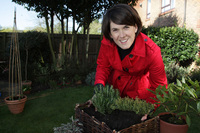Grow your own in Chesterfield

Taylor Wimpey has teamed up with RHS expert Alex Denman to show homeowners how to embrace the Good Life and grow their own vegetables. The homebuilder, which has new developments across the Chesterfield region, has partnered with the gardening expert to put together top tips, from what to grow to how to get the best from your harvest.
Advice includes creating the perfect growing conditions, maximising space and starting small for better results.
Anne Bagshaw, regional sales and marketing director, comments: “Spring is finally here and the longer days and warmer weather provide the ideal time to start thinking about the edible garden. With dining in more popular than ever and more of us wanting to know the provenance of our food, lots of us are deciding to flex our green fingers and grow our own produce for the table. That is why we have partnered with Alex to show homeowners that their garden can be an extension of the kitchen just by following a few simple steps.”
According to Alex Denman, there’s nothing more satisfying that growing your own. “Home grown vegetables are much easier to produce than you might think. Even with the minimum amount of equipment and space, you can grow all sorts of delicious foods. It’s important to grow things that you like and that you have a plot in mind that offers some sunshine – even if it’s your front garden or an apartment balcony! Beetroot, squashes and even peas can look great in an ornamental garden so don’t be afraid to use any space you have.”
Taylor Wimpey has a number of developments across Chesterfield. For further information, visit taylorwimpey.co.uk.
Alex’s Top Tips For Growing Your Own
Start small. Choose vegetables that are easy to grow such as carrots, potatoes and runner beans. They don’t need specialist care and will help to grow your confidence rather than put you off. Salad leaves such as lettuce, rocket or mizuna are incredibly easy to grow and are ready within the space of a few weeks.
Be creative. You don’t need huge amounts of space to grow your own veg. Potatoes will flourish in a big compost bag with a few holes cut into the side. Squash can be trailed over a pergola or up a trellis. Runner beans only need a largish pot and a wigwam of tall canes. If you live in an apartment, plant herbs and salad leaves in window boxes or you could even make a feature of strawberries by planting them in hanging baskets on a balcony and allowing them to trail over the edge!
Plan ahead. Try to stagger when your plants will be ready to harvest so that you have a range of produce to enjoy. For example, sow a few rows of radishes or rocket salad leaves and then wait a week and plant some more. It means you’ll have a constant supply rather than wasting food.
Rotting matters. Good soil is really important for your plants. In a small space, use grow bags from your local garden centre which will contain all the nutrients required. Alternatively, if you’re using a plot in the garden, the soil can be improved easily with a little manure or ideally start composting!
Be confident. Growing vegetables from seed is much easier than you think and more importantly, it can be cheaper! Crops such as salad leaves, beetroot and carrots are fairly simple to grow and the satisfaction you gain from starting from scratch is fantastic.
Taste the difference. It is true that home grown vegetables taste so much better! Spinach, peas, beans and salad leaves are more vibrant and contain more nutrients straight from the earth.
Be patient. Seeds can take time to germinate so be patient. Sweetcorn for example takes weeks to sprout. Keep tender seedlings such as tomatoes or courgettes in a greenhouse or sunny window sill until they are big enough to survive outside.
Waste not. If you do find you have surplus produce, don’t throw it away. Most vegetables are kept well in the freezer or if you feel like experimenting, try and create chutney or jam with what’s left over as it lasts through the winter if kept well.
Go organic. I prefer to use organic methods of pest control. Sunken slug traps containing beer and fleece nets to protect seedlings from bird or moth attacks work well. Aphids can be deterred by adding a little detergent to your water hand sprayer. Pests will always find a way so make sure you regularly check the leaves and stems and remove any unwanted visitors. Slugs particularly prefer the dark so be prepared to get your torch out!
Water, water, water. Although your veg should look after itself, in dry periods it will need a regular supply of water. Take care to water at regular intervals as irregular watering leads to vegetables splitting allowing pest and diseases to take hold and ruining the appearance.
For more gardening tips from Alex, visit: mygarden.rhs.org.uk or anmblog.typepad.com/denman.

